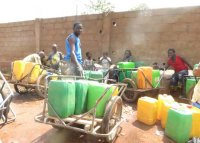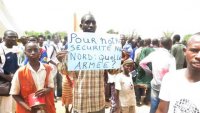www.aljazeerah.info
News, April 2012
Archives
Mission & Name
Conflict Terminology
Editorials
Gaza Holocaust
Gulf War
Isdood
Islam
News
News Photos
Opinion Editorials
US Foreign Policy (Dr. El-Najjar's Articles)
www.aljazeerah.info
|
Editorial Note: The following news reports are summaries from original sources. They may also include corrections of Arabic names and political terminology. Comments are in parentheses. |
Mali's Junta Signs Deal of Power Transfer with ECOWAS
Mali's junta signs deal of power transfer with ECOWAS
BAMAKO, April 6, 2012 (Xinhua) --
Mali's junta, which seized power on March 22, on Friday signed framework agreement with the ECOWAS that it would transfer power to the president of the National Assembly, the state TV report confirmed.
The junta will hand over power to the president of the National Assembly, Dioncounda Traore, during the transitional period, according to the agreement which also covers the formation of a national unity government and the lifting of sanctions by the ECOWAS.
The interim leader will be in a mission to organize democratic elections, said the agreement received by Xinhua correspondents, signed between the junta's captain Amadou Sanogo and mediators.
The transitional government will have to manage the crisis in the north of the country urgently, which has been seized by Tuareg rebels, either by a negotiated final settlement of peace or by war against the attackers, according to the statement. It also provides for a general amnesty law for all members of the junta involved in the coup.
Djibril Bassole, foreign minister of Burkina Faso, said the ECOWAS, like one country, will rise against insecurity and will not accept permanent division of Mali and insecurity in the country. He also said the ousted President Amadou Toumani Toure can resume a normal life under necessary security.
Once all the previsions of the framework agreement materializes, the ECOWAS will lift all sanctions against Mali, including closing borders and freezing the country's access to the regional central bank, according to the agreement.
The agreement followed a declaration from the National Movement for the Liberation of Azawad (MNLA) of independence of "Azawad," the northern part of Mali, on Friday morning, after it proclaimed an end to its military operations as of Thursday. Taking advantage of the chaos in the western African nation after a coup on March 22, the MNLA has taken control of three important northern towns, including Timbuktu, Kidal and Gao.
However, the unilateral declaration has met rejections from international communities, including the ECOWAS, the African Union, France and the United States. The ECOWAS said Mali is one and indivisible entity and will take all necessary measures, including the use of force, to ensure the territorial integrity of the country.
ECOWAS generals met in an emergency meeting Thursday in Abidjan to discuss a military intervention plan to help Mali restore peace and security as soon as possible. ECOWAS has already ordered a 2, 000-strong force to stand by for a possible intervention in Mali.
Editor: Chen Zhi
Mali junta agrees to transitional exit plan
Mali's military junta and the West African bloc ECOWAS announced Friday a deal that includes amnesty for those involved in last month's coup and a return to constitutional rule under an interim leader to oversee democratic elections.
News Wires (text)
AFP - Mali's military junta and the West African bloc ECOWAS announced a deal late Friday that includes the lifting of sanctions and an amnesty for those involved in last month's coup.
The agreement provides a framework for a return to constitutional rule under an interim leader who will oversee democratic elections and handle the crisis in the north, where Islamists and Tuareg rebels have seized control.
It came after Mali's Tuareg rebels declared independence Friday in the north, a move rejected by the international community and the Islamist insurgents they fought beside, as fears grew of a humanitarian crisis.
The United States, Africa and Europe dismissed the National Movement for the Liberation of Azawad's (MNLA's) declaration of independence.
The declaration, long a goal of Tuareg rebels, is a bid to formalise the situation on the ground.
A democratic success since its last coup 21 years ago, Mali is now roughly divided into a Tuareg rebel-controlled north and junta-controlled south.
ECOWAS chief Alassane Ouattara of Ivory Coast said sanctions should be lifted "immediately", Burkina Faso's Foreign Minister Djibril Bassole told public television station ORTM, referring to Friday's deal.
He also said President Amadou Toumani Toure, who was overthrown on March 22 and has not been seen since in public, should be able to live where he wants under army protection.
Bassole, speaking on behalf of ECOWAS Mali negotiator Blaise Compaore, the president of Burkina Faso, said: "We wanted... Toure to be allowed to return to the house of his choice and that he could also be protected by the defence and security forces."
He was speaking at Kati near Bamako, the headquarters of the junta, whose head, Captain Amadou Sanogo, read out the accord signed with the Economic Community of West African States (ECOWAS).
At the same place coup leader Sanogo had announced Tuesday that the junta planned legal action against Toure for "high treason and embezzlement."
The text of the deal was signed by Bassole and Sanogo, with Ivorian Minister for African Integration Adama Bictogo and Nigeria's Foreign Minister Nurudeen Muhammad as witnesses.
Under the agreement, to be carried out "under the aegis of the ECOWAS mediator and with the support of the international community," the speaker of the national assembly would become interim president with a transitional prime minister and government.
The single-chamber Malian parliament is headed by Dioncounda Traore, who is currently abroad.
The accord states that the interim president would have "a mission to organise a presidential election in the constitutional timeframe of 40 days."
However, given the "exceptional circumstances... due to the institutional crisis and the armed rebellion in the north" it would be impossible to hold elections within 40 days and so it was "indispensable to organise a political transition" until electoral lists could be revised and "accepted by all."
On April 2 ECOWAS decided to clamp an immediate total embargo on Mali, a north African country of 15 million inhabitants, in a bid to return to constitutional order after the March 22 military coup.
The embargo included the closing of all borders of ECOWAS states with Mali except for humanitarian reasons, closing to Mali access to ECOWAS ports, and the freezing of Malian bank accounts.
Complicating the picture in the African nation, a radical Islamist group, Ansar Dine, has exploited the chaos to swoop in and instal sharia law in parts of the north.
While for a time the Islamists fought in concert with the MNLA, they have given short shrift to their independence plans.
"Our war is a holy war," Ansar Dine military chief Omar Hamaha said.
"It's a legal war in the name of Islam. We are against rebellions. We are against independence. We are against revolutions not in the name of Islam."
Hamaha was speaking in a video obtained by AFP and France 2 television, filmed on Tuesday and Wednesday after the Islamists' takeover of the fabled city of Timbuktu.
In the city of Gao, witnesses said Ansar Dine had kidnapped seven Algerian diplomats, reports confirmed by the Algerian foreign ministry.
While the Islamists appeared to have the upper hand, the separatist MNLA on Friday morning declared the independence of their desert homeland, which they call Azawad, and where several rebellions have played out in past decades.
This latest one was fuelled by a flood of weapons -- and returning Tuareg fighters -- from Libya following Moamer Kadhafi's downfall.
"We solemnly proclaim the independence of Azawad as from today," Mossa Ag Attaher, a Paris-based MNLA spokesman said on France 24 television, confirming a statement on the group's website.
He told AFP the group was ready to help fight the "terrorism" of Al-Qaeda in the Islamic Maghreb.
But the international community swiftly rejected their proclamation.
The African Union dismissed it as "null and of no value whatsoever", while the European Union and United States both called for respect of Mali's "territorial integrity".
Amnesty International warned that north Mali was on the brink of a "major humanitarian disaster".
More than 200,000 people have fled since the rebellion began in mid-January.
Fair Use Notice
This site contains copyrighted material the
use of which has not always been specifically authorized by the copyright
owner. We are making such material available in our efforts to advance
understanding of environmental, political, human rights, economic,
democracy, scientific, and social justice issues, etc. We believe this
constitutes a 'fair use' of any such copyrighted material as provided for
in section 107 of the US Copyright Law. In accordance with Title 17 U.S.C.
Section 107, the material on this site is
distributed without profit to those
who have expressed a prior interest in receiving the included information
for research and educational purposes. For more information go to: http://www.law.cornell.edu/uscode/17/107.shtml.
If you wish to use copyrighted material from this site for purposes of
your own that go beyond 'fair use', you must obtain permission from the
copyright owner.
|
|
|
|
||
|
||||||




